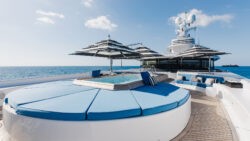Why 2025 is a Smart Year to Buy a Yacht?

With yachting, as in with life, timing is everything
Knowing when to chart your course or simply cast off is as crucial as knowing where you’re headed. In recent years, the yacht market has been something of a rollercoaster—albeit one set to a very pretty backdrop.
Thankfully, the market has regained its rhythm. The pace is steadier, the choices broader, and buyers are once again in a position to plan rather than pounce.
So, is 2025 a smart year to buy a yacht? If you value negotiating power, personalisation, and long-term value, then yes. Here’s why.
The market is ripe for opportunity
The pandemic had a profound impact on the maritime industry—and we’re still seeing the aftereffects, says Adam Papadakis, Moravia Yachting’s Head of Sales.
“It may seem strange to still be talking about it in 2025, but what we’re seeing now is the market correcting itself,” Adam explains. “What happened during Covid-19 was this: We saw a massive surge in demand from buyers—a surge in transactions.”
That wave of activity peaked in 2021.
“Of course, when you have a surge in demand, inventory can’t keep up. Prices spike, and availability drops. The market tried to catch up, eventually adding more product to the inventory. By the end of 2023, there were plenty of vessels for sale, so 2024 became the year of price reductions.”
What followed was a kind of overcorrection. Different categories felt the shift at different times. The 45-50-metre category—arguably the in-demand size range—led the way, followed by 60 metres and above, while smaller yachts, particularly in the 20-25-metre range, were slower to adjust.
“At the same time, more inventory was coming onto the market,” Adam says. “So, 2025 started with more inventory, better prices.
“This year is quite interesting—we’re seeing a nice trend, and whatever happens in the world right now doesn’t seem to have a huge impact on things. I expect this summer to be very active. This summer, we’ll see a lot of transactions happening compared to other years.”
Better quality yachts, better priced
Today, the picture is far more balanced, and generally, the sentiment is positive, Adam says.
“The inventory is there—good quality inventory—and pricing-wise, it’s on a very good trajectory, particularly in the last six to ten months, I would say. And having the right tools and intelligence means we complete the transaction efficiently, and we do it well.”
That sense of balance is crucial. For those considering a yacht investment in 2025, the current landscape offers a rare combination of selection, value, and stability. Pricing has adjusted, buyers have more choice, and negotiations are once again driven by long-term value, not urgency.
New builds are back in focus
If brokerage offers speed and certainty, the chance to find the right fit, right now, new builds offer something else: vision. They allow the chance to craft every detail from the hull up, creating a vessel that reflects your unique taste and lifestyle. Thankfully, prospective owners now benefit from clear build schedules and detailed order books.
Shipyards are planning into the future—and that clarity works in the clients’ favour. According to Boat International’s 2024 Global Order Book, there were 1,111 yachts over 24 metres on order as of 1 September 2023—up from 996 the year before, demonstrating a well-defined delivery pipeline into 2027. However, according to the 2025 edition, ‘the boom of new build sales is definitely over.’
The frenzy has passed; new, thoughtful projects can now flourish.
“That post-Covid rush has cooled off, but that’s not a bad thing at all,” Adam says. “On the contrary, for buyers, you’re not fighting for a slot. They’re not scrambling anymore. You can take time to think, plan, and with the right broker next to you—and technical team to guide you on those early critical stages to do things properly—you can build a yacht that actually fits your life, and on a timeline and budget that makes sense.”
Charter revenue makes ownership more attractive
And just as important, broader financial conditions are improving. Macroeconomic signals all point to a return of liquidity. In a recent report by Bain & Company, in Q1 2025, “private jets and yachts enjoyed solid order backlogs and growing charter demand.” Luxury travel, it seems, is resilient—and superyachts are the pinnacle.
So, demand remains high for yacht charter clients. And while summer 2025 is expected to be a bumper charter season, according to Nicolas Fry, Head of Charter Management, it is likely to continue along this trend. According to the same Bain & Company report, the ultra-high-net-wealth cohort is expected to grow by 15 to 20 percent over the next five years—that’s adding nearly 45,000 new prospective charterers by 2030.
Demand is long-term, not a passing tide.
For owners, that kind of consistency makes charter revenue a compelling case for investment. With the right set up, chartering a yacht can be both enjoyable and efficient.
When managed correctly
However, strong charter returns don’t happen by accident, says Nicolas Fry, Head of Charter Management. “It starts with smart structuring. The right flag state, fiscal representation, and commercial regulation can open the door to significant VAT and tax advantages, especially for charter operations within the EU.”
Factor in optimised crew arrangements, insurance planning, and seasonal deployment, and you’ll see a much leaner, more finely tuned programme.
“Done properly, the structure of ownership and operations can unlock meaningful efficiencies,” Nicolas explains. “It’s not just about avoiding the pitfalls but about building a model that works for you financially, legally, and operationally.”
Insight makes all the difference. Charter managers and brokers work together to draw on both ownership and operational experience to guide clients towards yachts with proven charter potential; vessels that work, not just in theory, but in practice.
“Some clients come to us with a very specific idea,” says Nicolas. “Others just know they want a yacht that charters well. Either way, we help them think long term about value, about viability, and about visibility in the charter market.”
So, why 2025? Because the market is level-headed. Inventory is strong. And charter demand is resilient and set to grow. If you’ve been waiting for the right time to move from curiosity to commitment, this might just be it. With the right team beside you, the rest falls into place.
From here, the course is yours.
If the timing feels right, let’s explore what that might look like:







 Previous news article
Previous news article